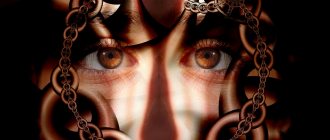Medical information is reliable Checked by Shaidullin Renat Flyurovich
Dissocial personality disorder is a mental disorder accompanied by a person’s desire to “break” the norms and rules of behavior in society. When committing “bad” actions, such a patient does not realize that he is wrong. His actions are accompanied by aggression, impulsiveness, and conflicts with others. Such behavior disrupts social ties; this person is consciously shunned by friends, colleagues, and relatives.
At Dr. Isaev’s Clinic you can undergo a course of treatment for the disease with preliminary diagnosis. Experienced doctors implement a complex of effective treatment methods using traditional methods and proprietary therapy techniques. All methods of treating dissocial personality disorder in Moscow are used in accordance with the license of the Russian Ministry of Health for conducting medical activities.
Basic information about the disease
Personality disorder of the dissocial type occurs more often in adolescence. The person does not experience feelings such as remorse, guilt or shame. Such traits get worse over time and persist throughout life. Timely treatment will help you return to a normal state of mind.
Such patients have an impaired ability to form any types of attachments. They cannot sincerely be friends, love and rejoice for a loved one. Patients with this diagnosis are convinced that their own needs come first and that all actions are legitimate. If necessary, they rudely violate the personal boundaries of other people and neglect their feelings.
In some cases, a psychiatric clinic is the only place where the patient can get help. The diagnosis is based on studying the medical history and talking with the patient. Treatment for dissocial personality disorder involves the use of medication and psychotherapy.
According to statistics, this pathology develops more often in men than in women. At risk are residents of large cities, representatives of low-income segments of the population, and children from large families. These people often believe that they have suffered a lot in life, and therefore consider others to be indebted to them for the hardships they have experienced.
general information
Dissocial personality disorder (DID or DID) is also popularly called sociopathy or psychopathy. Doctors do not use such terms in their practice, at least not in medical research.
DID is included in the International Statistical Classification of Diseases and Related Health Problems, abbreviated ICD 10.
Most common among men. Perhaps this is due to the fact that representatives of the stronger half of humanity are more aggressive and impulsive. According to statistics, it is detected in 3% of men and only 1% of women.
That the behavior of sociopaths is antisocial is supported by evidence from prison services. It turns out that about 75% of the world's prisoners are people with DID.
But it is worth considering that not all dissocials are criminals. Most of them commit acts for which it is difficult, and sometimes impossible, to prove guilt. Or they are unacceptable in society, but are in no way punishable by law.
Most often it affects those who belong to disadvantaged sections of the population. Especially if they grew up in large families. And also city residents.
Reasons for the development of the disease
Experts in the field of psychiatry put forward two main theories of the formation of the disorder. According to the first, the disorder develops due to heredity. The opposite opinion is that pathology is the result of the unfavorable influence of the environment on the formation of personality from an early age. This concept includes a lack of love from a significant adult, excessive care or neglect.
Most specialists take an intermediate position. They believe that the prerequisites for the development of pathology were formed as a result of the interaction of internal and external factors. In patients with schizophrenia, oligophrenia and other mental disorders, the likelihood of developing dissocial personality disorder is very high.
Answers to popular questions
- Can dissociative disorder be completely cured?
Some forms can be cured completely, others can be put into a state of long-term remission, especially if you do not delay and immediately contact specialists. To avoid relapse, the patient and his relatives must comply with all doctor’s instructions and rules for preventing the disease.
- Is dissociative disorder only treated in a hospital setting?
Yes. Medicines relieve the symptoms of the disorder, but psychological causes can only be identified and eliminated during long-term treatment. Doctors provide full support and protect the patient from suicide.
- What can happen if the disorder is not treated?
The patient is constantly depressed, which leads to a complete loss of motivation to live and achieve their goals. Failures in diet and sleep lead to the development or exacerbation of existing chronic diseases. All factors, taken together and individually, can lead to the patient’s death, including suicide.
Signs of mental disorder
There are several main symptoms that help determine the presence of this disease. The final diagnosis will be made by a psychiatrist if three or more signs appear simultaneously over a long period of time.
- Various dependencies
Patients are prone to addictive behavior that violates the norms of public morality. The pathology is often accompanied by drug addiction, substance abuse, and alcoholism. Sometimes the initial diagnosis is accompanied by a secondary one – bulimia (overeating without control of one’s actions and the amount of food consumed).
- Illegal actions
At the beginning of the development of dissocial personality disorder, a person may commit actions that are condemned by society. The feeling of being right and impunity leads to illegal actions. Such patients are often members of illegal criminal groups. It costs them nothing to break the law, because their internal beliefs do not contradict such an outcome.
- Ignoring safety rules
Patients with this diagnosis do not respect other people and do not value their lives. They do not realize that they also need to take care of their health. Neglect of safety rules, unreasonable risks at home and at work are the main characteristics of a sick person. Such actions bring him great pleasure, a feeling of superiority and omnipotence. Examples include driving a car at high speed or working at high-rise objects without insurance.
- Hypocrisy as a main character trait
Such a patient is practically unable to demonstrate positive traits. He lies a lot, using it for his own selfish interests. The lies drag on, he gradually forgets what he told and to whom. When such a person is caught in deception, defense mechanisms are activated in the form of aggression and conflict. The patient does not admit that he is wrong, but tries to defend his position by any means.
- Irresponsibility
A person with dissocial personality disorder always places responsibility on others. Even if in a certain situation it is only his fault, he begins to express complaints in an aggressive manner. You can never rely on him. Loyalty, devotion and other values are not characteristic of the patient.
- Difficulties in making money
Low income is a secondary symptom; it does not always indicate the presence of pathology. The reason is that the patient often changes jobs. He is not interested in being around colleagues whom he has already manipulated. He does not experience any moral discomfort when changing profession or position.
- Aggression and conflict
Such people always attack others. For them, there is no other person's correct opinion. Irritability for any reason and short temper are demonstrated daily. The basis of this behavior is the inability to cope with aggression and anger. In a state close to passion, they can destroy furniture and harm the health of others.
- Desire for social isolation
This trait manifests itself mainly on a subconscious level. If a patient with dissocial personality disorder is asked whether he wants to be left alone, the answer will be no. The lack of ability to form strong social connections leads to forced loneliness. Even if someone wants to surround such a person with love and care, he will eventually destroy everything. Only the closest people who are in a codependent relationship with such a person remain nearby.
- Tendency to violence
It involves both psychological and physical or sexual violence against another person. Such people choose as victims the weak and weak-willed, those who cannot give them a worthy rebuff. The feeling of one's own superiority clouds the mind. Physical abuse of other people by these patients is not uncommon. If a person who tortured and killed animals for pleasure ends up in the dock, he most likely has this diagnosis. These people play the role of executioner in life, choosing victims in all social contacts (at work, in the family, etc.).
- Lack of ability to interact with others
Patients with the disorder have pathology in the emotional sphere. When they commit illegal acts, others condemn them. But no words or actions can violate the conviction that one is right. Patients do not trace cause-and-effect relationships between actions and consequences.
- Tendency to destruction
Damaging someone else's property sometimes becomes the primary goal of such a patient. He cannot eat, sleep, breathe until he commits a bad act. The desire to punish other people in people with dissocial personality disorder may arise in response to developed envy of them, their successes and achievements.
- Related disorders
DID is accompanied by other mental disorders. Such people often suffer from paranoia, panic attacks, chronic depression, manic syndrome, and schizophrenia. During diagnosis, it is important to establish which pathologies accompany dissocial personality disorder. The prescribed treatment regimen depends on this.
- External charm
This is one of the most important characteristics of the patient. Outwardly, these are quite nice people with charisma. They know how to speak beautifully and promise a lot. Behind such a picture is a person who can stab you in the back. Charm makes it possible to quickly establish connections that are destroyed over time.
Myths
Such a person is easy to recognize
Not so. Modern cinema only contributes to the incorrect perception of information. In films, sociopaths are easily recognizable and instantly arouse suspicion and rejection.
But in reality things are different. In addition, people with this disease usually have a lot of other related problems that complicate the diagnostic process for specialists. What then can we say about people who do not encounter DID in their practice and life in general?
Treatment only worsens the person's condition
There are a number of experts who are inclined to this opinion. But treatment can only interfere if the methods are chosen incorrectly, or if they are outdated and require complete abandonment.
In principle, harm can be caused by any disease, both mental and physical, if you have sufficiently scanty information about the disease itself and how to combat it. Agree, a simple and insignificant wound can endanger a person’s life if a dirty plantain leaf is applied to it.
Hypnosis in the treatment of DID is only necessary to access memories
An individual with psychopathy has impaired communication, both with other people and between his own dissociative parts.
It is for these purposes that hypnosis is used. To improve communication. And not to restore lost memories. In addition, according to the latest data, a person under hypnosis can describe any events very colorfully.
So colorful that there is no doubt about their reality. But in vain. Because patients often talk about things that have never actually happened in their lives. The imagination works so actively at such a moment that it is impossible to determine where is fiction and where is the truth.
Diagnostics of DRL
Making a diagnosis is possible only after collecting anamnesis and personal conversation with the patient. During the dialogue, the specialist asks what emotions a person experiences in specific situations. If he says that he does not have positive feelings towards others, that moral standards are an empty phrase for him, there is a reason to carry out further diagnostic measures. They will allow you to confirm the original version. An experienced psychiatrist can easily recognize lies when the patient tries to create an impression of himself as a positive member of society. Disguise will not help him “hide” in front of a specialist.
Treatment of dissocial personality disorder in Moscow
Treatment of such a disorder is challenging. Only relatives can notice that something is wrong with a loved one. Often they are the ones who seek medical help. The patients themselves do not experience negative emotions. Motivating them to go to a psychiatric center is problematic.
Individual consultations with a psychotherapist will help you find the reason that contributed to the development of the pathology. If necessary, consultations with a psychiatrist or neurologist are prescribed. Unfortunately, such patients rarely make contact with a psychotherapist. They try to leave the session as quickly as possible without drawing any conclusions.
The patient can attend group classes for self-help purposes. During a conversation with other participants, he can open up and talk about his feelings. At the same time, there is no fear of being rejected. Treatment of dissocial personality disorder in Moscow in our clinic is an attempt to return a person to normal life. In most cases this is successful.
Drug therapy is necessary in the presence of concomitant mental disorders. Antidepressants are prescribed for chronic depression, nootropics for deterioration of brain structures. If an individual refuses to go to the clinic, you can call a psychiatrist to your home. The specialist will make a diagnosis and prescribe treatment.
Diagnosis
The diagnosis is made only after long-term observation of the patient until he reaches the age of eighteen, since the symptoms that appear can be considered a behavioral disorder.
The final diagnosis is made based on the following criteria:
- Symptoms continue until age fifteen.
- The presence of at least three symptoms of the disorder.
- Symptoms that occur outside of episodes of schizophrenia or manic disorder.









